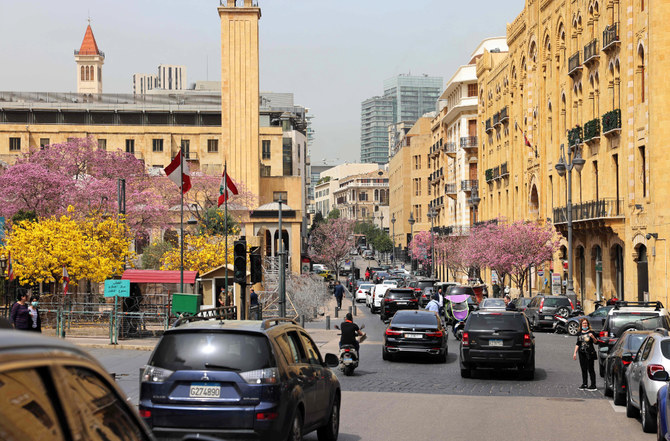BEIRUT: The Saudi and Kuwaiti ambassadors to Lebanon, Walid Bukhari and Abdul-Al Sulaiman Al-Qenaei, have returned to Beirut, arriving on Friday afternoon amid a resurgence of hope for a reset in diplomatic relations for the beleaguered country.
They landed at Beirut airport less than 24 hours after the Kingdom and Kuwait announced that their envoys would return to Lebanon, sparking optimism about a fresh start with the Arab Gulf states after a five-month diplomatic boycott.
Lebanon’s Grand Mufti Sheikh Abdel Latif Derian said: “This decision establishes a new phase of hope and confidence in Lebanon’s Arab future, identity, belonging and cooperation with the Gulf countries and the rest of the brotherly Arab states.”
Saudi Arabia, Kuwait and other Gulf states recalled their ambassadors from Lebanon in October 2021 in protest against insulting statements made by former Information Minister George Qordahi regarding the war in Yemen.
On Thursday, the Saudi Foreign Ministry announced Bukhari’s return to Beirut. The ministry said the move was made in response to the “calls and appeals of moderate national political forces in Lebanon, and in confirmation of the Lebanese Prime Minister Najib Mikati’s statement of the government’s commitment to take the necessary and required measures to enhance cooperation with the Kingdom and GCC countries and to stop all political, military and security activities affecting the Kingdom and GCC countries.”
The ministry stressed the importance of Lebanon’s return to its Arab origins, represented by its national institutions and agencies, in order for the country to enjoy peace and security, and for its people to enjoy stability.
On Friday, the Kuwaiti Foreign Ministry announced the return of its ambassador to Beirut in response to “the Lebanese government’s commitment to stop all aggressive activities and interventions offensive to Arab countries.”
Mikati stressed in a tweet that Lebanon is proud of its Arab affiliation. “Lebanon is committed to the best relations with the Gulf states, which were and will remain a support to us,” he noted.
Former Lebanese Prime Minister Tammam Salam telephoned Bukhari, praising “the distinguished brotherly role that the Kingdom has played and continues to play toward Lebanon and the Lebanese.”
Interior Minister Bassam Mawlawi said: “Saudi Arabia has proved that Lebanon is in its heart and conscience, and it will never leave it.”
The Future Movement said that it hoped that the decision would constitute a step on the way to opening a new page in Lebanese-Gulf relations, stressing the necessity of not using Lebanon as a political, security and media platform to insult the Gulf states and leaders.
The return of Gulf diplomatic ties coincided with the announcement of a staff-level agreement between Lebanon and the International Monetary Fund, which has also contributed to a sudden wave of positivity.
On Friday, the IMF published the full text of the draft agreement with the Lebanese government.
Deputy Prime Minister Saadeh Al-Shami said: “A preliminary agreement has been reached for a four-year extended fund facility. This economic and financial reform program aims to stimulate growth and provide job opportunities and put Lebanon on the path to recovery after the economy shrunk by more than 60 percent during the past two years, the local currency collapsed, inflation reached very high levels, and poverty hit unprecedented rates.”
The agreement needs the approval of the IMF, the Lebanese government and parliament, especially with regard to urgent laws that must be approved before obtaining the final approval of the IMF’s board of directors for the program.
Al-Shami noted: “This program is based on providing an environment conducive to economic activity by implementing the necessary structural reforms to restore growth and secure job opportunities, restructure the banking sector to be able to restore its role in financing the economy and improve public finances to secure debt sustainability while increasing expenditures on social sectors and infrastructures.”
He added: “It also revolves around reforming the public sector and its institutions, especially the electricity sector, to secure better electricity supply, which helps in easing the burdens on citizens and reviving the economic movement, in addition to unifying the exchange rate, improving governance and fighting corruption with technical assistance from the IMF.”
“The longer we delay in implementing the required reforms, the higher the cost will be on the national economy and, consequently, on citizens,” Al-Shami warned.
“We hope that the prior conditions set by the IMF are met in order to have a program approval,” Central Bank Gov. Riad Salameh told Reuters, describing the agreement as “a positive event for Lebanon that will contribute to the unification of the exchange rate,” noting that the Central Bank cooperated and facilitated the mission.
Speaking to the Middle East News Agency, Salameh said: “The gold reserves at the Central Bank amounted to $17.547 billion as of February, so Lebanon maintains its position with the second-largest gold reserves in the Arab region, with a wealth estimated at about 286 tons of gold.”
He added: “As of February, the total cash reserves of foreign currencies amounted to $12.748 billion and the stock portfolio amounted to $4.197 billion and includes Euro bonds, a slight increase from January.”
Salameh said: “The remittances of Lebanese working abroad amounted to about $6.4 billion in 2021.”
He added: “The crisis that hit the financial sector in Lebanon is being addressed in the recovery plan that is being prepared by the Lebanese government in cooperation with the IMF.”
Salameh said: “Rumors about the Central Bank going bankrupt are false; the bank is exercising its role entrusted to it under Article 70 of the Code of Money and Credit and will continue to do so, despite the losses that afflicted the financial sector in Lebanon.”
















